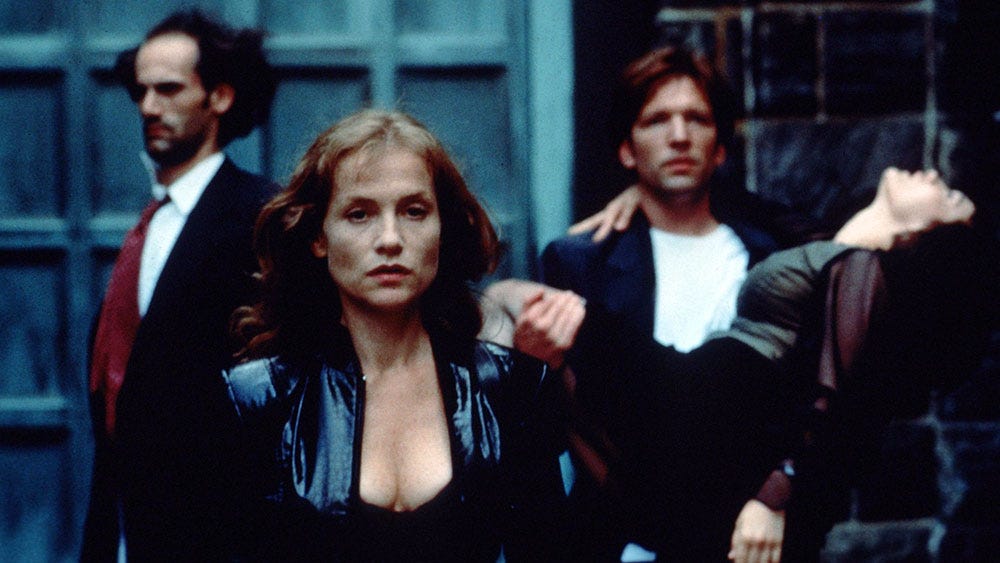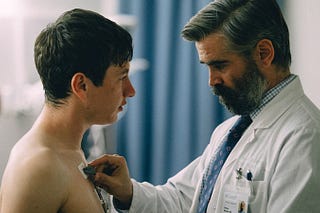
Revisiting 'Amateur' and the forgotten cult of Hal Hartley
In the early-to-mid '90s, Hal Hartley was talked about like the Coens, Richard Linklater and other young indie directors. 'Amateur' reveals why.
Among a certain set of movie-crazy undergrads in the early 1990s, Hal Hartley was the coolest young director alive. You’ll have to trust me on this, because contemporary evidence is scarce. If you identified as an “indie type,” as I did during this period, VHS tapes of his first two features, The Unbelievable Truth and Trust, were in heavy backpack circulation, and his hour-long Surviving Desire became a coveted rarity, like owning a copy of Neil Young’s On the Beach. The star of Hartley’s first two films, Adrienne Shelly, was a hipster queen of the first order, on a level with Anna Karina and the girl from the record store. As the Coens were coming in with Miller’s Crossing and Barton Fink, and Richard Linklater with Slacker and Dazed and Confused, Hartley was firmly in the middle of the conversation, revered for the unique deadpan rhythms of his dialogue and soundtracks that seemed like pristinely curated mixtapes.
And then the Hartley faded into semi-obscurity in the 21st century, having never broken out beyond this small, passionate cadre of admirers. Most of his features from the ’90s got prominent distribution from mini-majors like Fine Line and Sony Pictures Classics, but only 1997’s Henry Fool inched above the magic $1 million mark—enough of a haul to prompt two sequels much later, 2006’s Fay Grim and 2014’s Ned Rifle—and 2001’s No Such Thing, which he made for a real studio (MGM/UA) under Francis Ford Coppola’s supervision, was poorly received and indifferently released. That his sensibility proved to have a low commercial ceiling was hard to ignore; his first two films were low-budget breakthroughs, but they were far from Slacker-level phenomena, and nothing that followed quite connected beyond his devotees.
Though Hartley has continued to work independently—Ned Rifle, if nothing else, affirmed Aubrey Plaza as his ideal star, sexy and disaffected—the films from his early-to-mid ’90s prime have been difficult to access in the streaming era, which has severed them from generations younger than X. (See also: The Zhang Yimou films from the same era, an astonishing run that includes Ju Dou, Raise the Red Lantern, The Story of Qui Ju and To Live.) In response, Hartley himself launched successful Kickstarter campaigns to make physical copies of his work available through his website, but digital availability has been sporadic at best. So when his 1994 crime comedy Amateur popped up this month on Criterion Channel as part of an extraordinary 17-film series on Isabelle Huppert, I was anxious to revisit the film for the first time since seeing it in theaters nearly 30 years ago.
Coming after a series of relationship comedies, Amateur is an exercise in genre deconstruction, which presents an additional barrier to those put off by the archness of Hartley’s style. Is any of this sincere or is he merely tweaking crime-movie traditions with stark ironies and an absurdist bent? It takes time to access the soul of Amateur, but the film is among Hartley’s funniest, loaded with droll exchanges and a nonsense plot where the Macguffin, a pair of incriminating floppy disks, mostly leaves characters musing over the fact that they’re neither discs nor floppy. Hartley is a stickler for language, and it’s as troubling for his characters that these things are square and stiff as it is that an multinational crime boss named “Mr. Jacques” will kill for them.
In a rare comedic role, Huppert melds perfectly into the Hartley universe by playing it straight, emphasizing the innocence and fish-out-of-water naivety of a former nun who’s still adjusting to life after 15 years in the convent. Her character’s first name is also Isabelle, who ekes out a meager living in New York writing erotic fiction for pornography magazines, despite never having had sex before. While Isabelle is typing out a new story in a diner—“Frank’s calloused hand worked its way up her tight-fitting skirt and caressed her perfect ass…”—an amnesiac named Thomas (Martin Donovan) stumbles in, still disoriented after a fall from a second-story window. Thomas doesn’t know who he is, where he lives, or what happened to him, so Isabelle, still the kindly nun, brings this stranger into her apartment until he can figure things out.
Meanwhile, we learn that Sofia (Elina Löwensohn), a porn star, pushed Thomas out the window because she blames him for introducing her to drugs and bringing her into the adult film business. She also wants revenge on Mr. Jacques, the unseen crime boss who bankrolls her films, and for that she turns to Edward (Damian Young), an accountant who has two floppy disks' worth of incriminating material. Sofia tries to leverage the disks into a blackmail scheme, but that only draws Jacques’ goons into the picture, which in turn brings in Thomas and Isabelle, the latter of whom convinces herself that “saving” Sofia is a calling from God.
The most immediate point of comparison for Hartley is Jim Jarmusch, another New Yorker whose deadpan sensibility and cool dismantling of convention is rooted in French cinema, particularly the work of Jean-Luc Godard and Jean-Pierre Melville. (Hartley even has a minor character here named Officer Melville.) But Hartley’s characters in Amateur are more like reconstituted movie archetypes than the mundane urban dwellers of Jarmusch’s earlier work. The impeccably suave Thomas remembers nothing, but he knows how to smoke beautifully. A character named “George the pornographer” is not the standard sleazebag, but an intellectual type whose true aspiration in life was “defamatory journalism.” And the conception of Isabelle as a virginal nun who writes pornography is further contrived by her claim to be a nymphomaniac. (“How can you be a nymphomaniac and never have sex?,” asks Thomas. “I’m choosy,” she replies.)
The bungling henchmen who come after Sofia are straight out of a film like François Truffaut’s Shoot the Piano Player, another comic riff on crime movies, but Hartley gets caught up in things like the blah day-to-day details of the gig. When one of them goes off to grab some lunch, the other reminds him to keep the receipt, presumably to satisfy the bureaucratic requirements of their international crime organization. Hartley rattles off enough offbeat one-liners in Amateur to sustain it, and perhaps to sustain this piece I’m writing right now. (A girl on a park bench, asking about Thomas’ porno mag: “Do all women have hair between their legs like this?” “Yeah, I guess. Most. There’s a woman on page 22 who doesn’t.”)
Yet Amateur isn’t without sincerity or substance. If Hartley hadn’t used the title Trust already, it could apply to the relationship between Isabelle and Thomas, whose amnesia calls his true self into question. There’s a reason Sofia pushed him out of a window. And she’s not the only one who hints that he was an evil man before he forgot who he was. Isabelle doesn’t know that person, only the vulnerable, helpless soul that her good-hearted nature has compelled her to revive. She wants him to be the one to make love to her, but she naturally has to worry about a reversion to his old self. And beyond that, can he be forgiven for sins he cannot remember having committed? What’s the path to redemption for a blank slate?
“I don’t know what I’m sorry for,” says Thomas to Sofia, who can forget but not forgive. “But I am sorry. That’s got to mean something, right?” Isabelle will eventually find out about all the terrible things he’s done, and it’s up to her to decide who he really is, which Hartley elegantly expresses in her decision to load the gun he’s using to protect them . Her challenge is discovering who he is and accepting him. Her willingness to do so is tied to her adolescent impulse to join a convent. It’s also something everyone does when they fall in love.

















A good chance to share my favorite piece of Hartley miscellany: https://youtu.be/xgA6cpPNXEk
Thanks for shining a light on Hartley - I was one of those early-90s Hartley-obsessed 20-somethings as well, and had one of those beloved TRUST VHS tapes. I will say that I remember being a bit disappointed by AMATEUR when it came out, largely because it followed his all-time masterpiece SIMPLE MEN (which is still one of my favorite films). I cannot recommend it highly enough - and there happens to be a copy on YouTube (for now): https://www.youtube.com/watch?v=PyTMvU0scbI